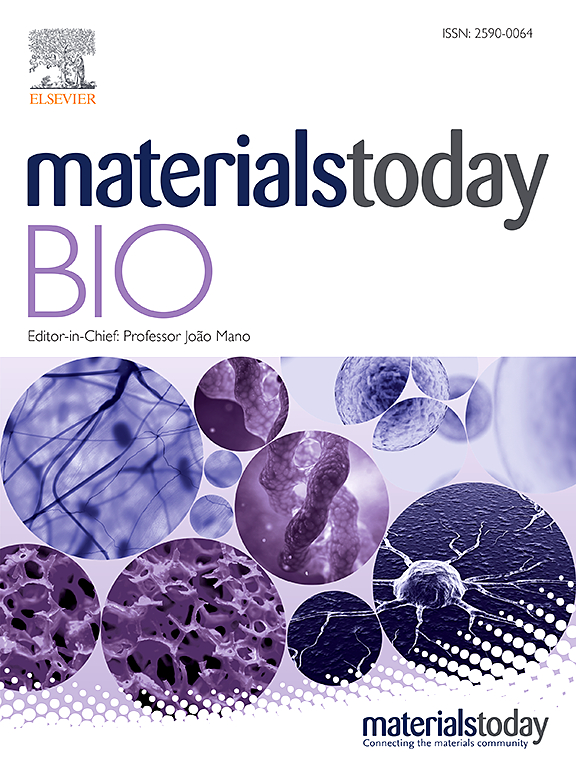人参纳米颗粒通过调节巨噬细胞极化和恢复内皮细胞功能加速糖尿病伤口愈合
IF 10.2
1区 医学
Q1 ENGINEERING, BIOMEDICAL
引用次数: 0
摘要
血管功能障碍和不同亚型巨噬细胞之间平衡的破坏是导致糖尿病伤口愈合不良的关键因素。本研究发现,人参源纳米颗粒(GDNPs)可促进糖尿病创面微环境中的血管生成,调节巨噬细胞极化,从而促进糖尿病创面愈合。研究发现,GDNPs可显著促进高糖(HG)条件下暴露于H2O2的人脐静脉内皮细胞(HUVECs)的细胞活力,同时增加HUVECs的血管生成能力,并减弱H2O2诱导的氧化应激水平升高。此外,GDNPs有效调节巨噬细胞(RAW264.7)向M2表型极化,发挥抗炎作用。结果表明,GDNPs通过PI3K/AKT/HIF-1α和TLR4/MyD88/MAPK通路促进糖尿病血管生成,减少炎症和氧化应激,调节巨噬细胞极化,加速创面愈合。这项研究为GDNPs在糖尿病伤口愈合中的治疗益处提供了见解。本文章由计算机程序翻译,如有差异,请以英文原文为准。

Ginseng-derived nanoparticles accelerate diabetic wound healing by modulating macrophage polarization and restoring endothelial cell function
Vascular dysfunction and disruption of the balance between different subtypes of macrophages are key factors contributing to the poor healing of diabetic wounds. This study revealed that ginseng-derived nanoparticles (GDNPs) can promote angiogenesis and regulate macrophage polarization in the diabetic wound microenvironment, thereby promoting diabetic wound healing. GDNPs were found to significantly promote the cell viability of human umbilical vein endothelial cells (HUVECs) exposed to H2O2 under high glucose (HG) conditions while increasing the angiogenic capacity of HUVECs, and attenuating the elevated levels of H2O2-induced oxidative stress. Moreover, GDNPs effectively regulated macrophage (RAW264.7) polarization towards the M2 phenotype, exerting anti-inflammatory effects. The results indicated that GDNPs act on the PI3K/AKT/HIF-1α and TLR4/MyD88/MAPK pathways to promote angiogenesis, reduce inflammatory and oxidative stress, modulate macrophage polarization, and accelerate wound healing in diabetes. This study provides insights into the therapeutic benefits of GDNPs in diabetic wound healing.
求助全文
通过发布文献求助,成功后即可免费获取论文全文。
去求助
来源期刊

Materials Today Bio
Multiple-
CiteScore
8.30
自引率
4.90%
发文量
303
审稿时长
30 days
期刊介绍:
Materials Today Bio is a multidisciplinary journal that specializes in the intersection between biology and materials science, chemistry, physics, engineering, and medicine. It covers various aspects such as the design and assembly of new structures, their interaction with biological systems, functionalization, bioimaging, therapies, and diagnostics in healthcare. The journal aims to showcase the most significant advancements and discoveries in this field. As part of the Materials Today family, Materials Today Bio provides rigorous peer review, quick decision-making, and high visibility for authors. It is indexed in Scopus, PubMed Central, Emerging Sources, Citation Index (ESCI), and Directory of Open Access Journals (DOAJ).
 求助内容:
求助内容: 应助结果提醒方式:
应助结果提醒方式:


